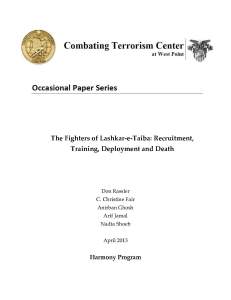This occasional paper is an analysis of over 900 biographies of the deceased militants of Lashkar-e-Taiba (LeT), a well-established Pakistani militant group that is best known for its November 2008 high-profile attack against a mix of local and foreign targets in Mumbai, India. Instead of evaluating evidence of the group’s internationalism, as many recent studies have attempted to do, this study is more foundational in focus. It is predicated on the assumption that LeT’s local activity and infrastructure are and will remain the key source of its strength, even if the group decides it is in its interest to become more active in the international arena. By leveraging biographical information extracted from four Urdu language publications produced by LeT from 1994 to 2007 and statistical information released by the government of Pakistan, this study aims to provide baseline data about LeT’s local recruits, the nature of the time they spend with the group and how these dynamics have changed over time.
Two other documents – the dataset from which the paper’s conclusions were derived and an Appendix that explains our coding methodology – are also being released in conjunction with the report, as it is our hope that other interested scholars will build upon our data/work.
The dataset (in excel form) can be downloaded here
The Data Appendix can be downloaded here
 Skip to content
Skip to content

